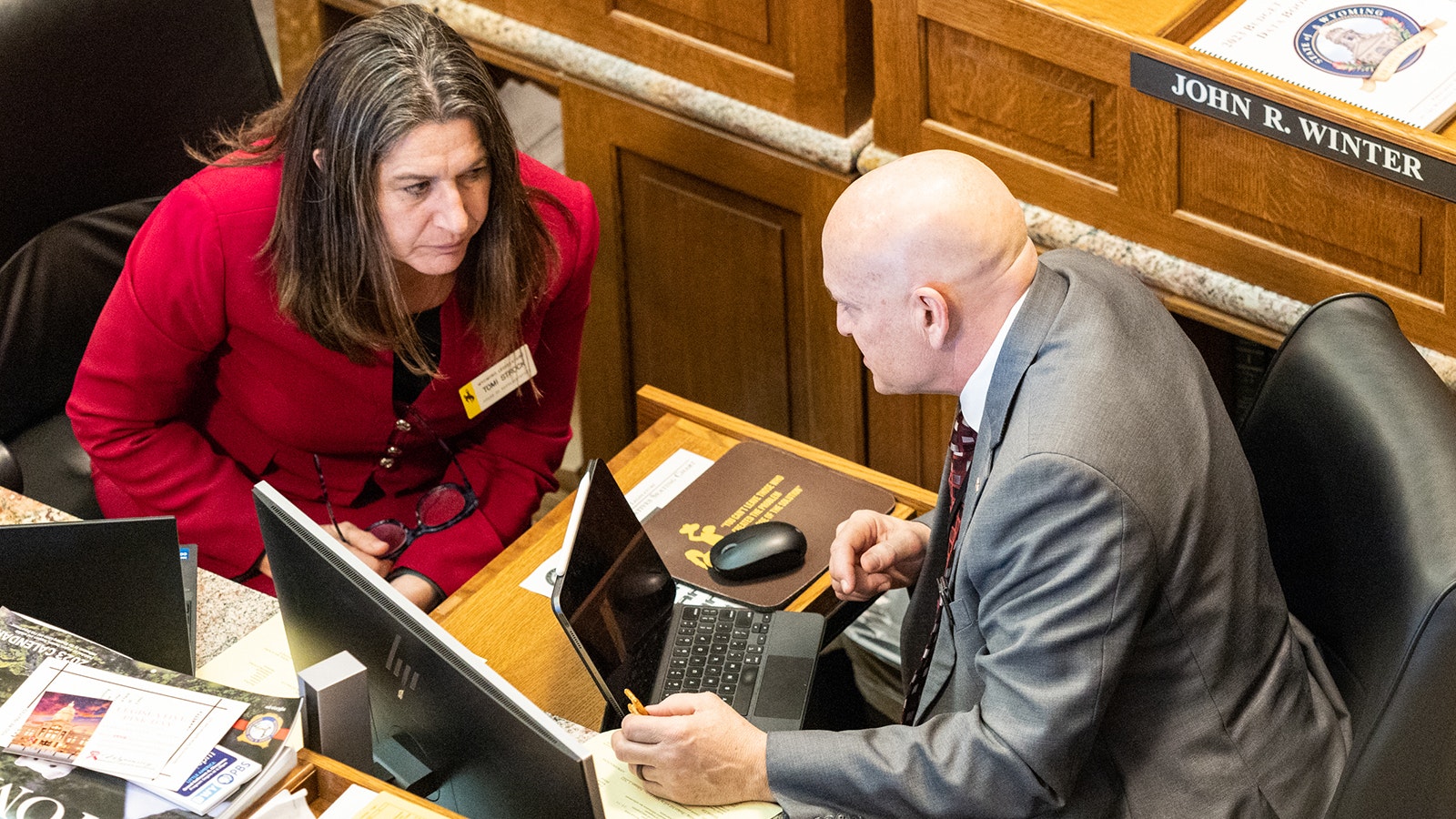The Wyoming Freedom Caucus, a growing group of staunchly conservative members of the Wyoming Legislature, delivers daily text messages and other communications encouraging members and state legislators aligned with it about how to vote on each bill they consider.
“We’ve got, in a sense, robo-voting happening where people are just voting because they’re told how to vote, not because they’re actually thinking through the issues,” a member of the state Legislature told Cowboy State Daily, who asked not to be identified out of concern for retaliation. “We are seeing members who are not using their critical thinking skills and just simply voting because they’re told that way.”
A text message the lawmaker shared with Cowboy State Daily shows the caucus taking a stance on 55 proposed bills, offering remarks ranging from opposition to support to an occasional “opposed” followed by two exclamation marks.
State Rep. Daniel Singh, R-Cheyenne, said the messages originate from the national State Freedom Caucus Network, which has a Wyoming state director working at the Wyoming Capitol every day.
“We see the Freedom Caucus members getting that daily text telling them how to vote versus actually thinking through the issues and asking themself, ‘How does this affect my district?’” the anonymous legislator said.
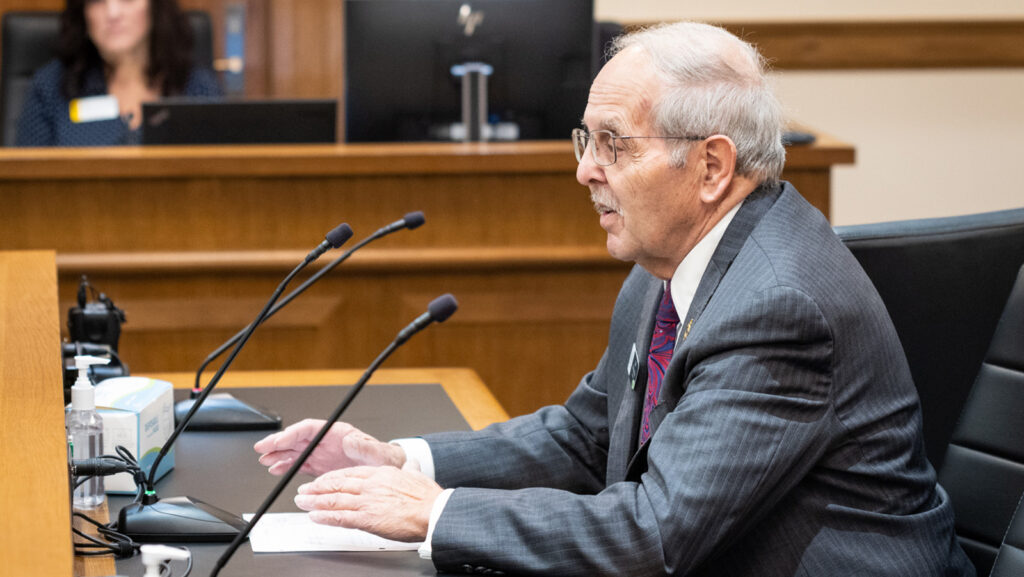
Wyoming Legislature. (Matt Idler for Cowboy State Daily)
Not So Unusual
Singh said messages like these are no different than communications sent out by other lobbying groups like the Wyoming Stock Growers Association that take stances on specific votes or pieces of legislation.
For example, talking points were provided to Senate President Ogden Driskill, R-Devils Tower, by attorneys and supporters of a pro-life abortion bill last week.
“That isn’t necessarily some sort of devious practice that the Freedom Caucus is involved in,” Singh said. “They’re just analyzing the legislation and giving recommendations.”
But Jim Magagna, executive vice president of the Stock Growers Association, said there is a difference.
Magagna said his group’s positions are strictly limited to legislation that affects their industry and are not always directly brought to the attention of lawmakers. The Freedom Caucus does have a wide range of bills it takes stances on, but in a text shared with Cowboy State Daily it only took a formal position on about half the 55 bills listed.
Another key difference between the Freedom Caucus and a traditional lobbying group is that the latter are generally made up by third-party members of the public, while the Freedom Caucus has official members who also are members of the Legislature actively voting on legislation.
It’s Politics
Michael Von Flatern, a Gillette lawmaker who served for 15 years and as Senate vice president, said he sees the Freedom Caucus’ behavior as a trickle down from standard party caucus behavior where similar vote directives are issued.
“It’s the same as the Democrats and the Republicans when they get together,” he said. “You vote your conscience, but it’s really a party derivative.”
The anonymous legislator said Freedom Caucus members have been observed voting one way on their voice vote or early on in a roll call, then change when they see how their fellow members are voting.
“I’ve had members admit to me they didn’t vote for bills they know was good for their community because they were scared of the Freedom Caucus and getting a bad score on WyoRINO(.com),” they said. “Every legislator feels the pressure to stay in office, but to what extent do you let that be the guiding component to what you do?”
It’s not uncommon for political rating websites like WyoRINO to note a legislator’s stance on an early vote of a bill, even if they took a more conservative stance against the bill later on. This was commonly used during the 2022 campaign season.
Rep. Dan Zwonitzer, R-Cheyenne, said many Freedom Caucus members have intentionally forced roll call votes to use as content for these metric sites.
“They can do some ranking that says they’re all 100% conservative and we’re all liberals, I suppose is the plan,” Zwonitzer said.
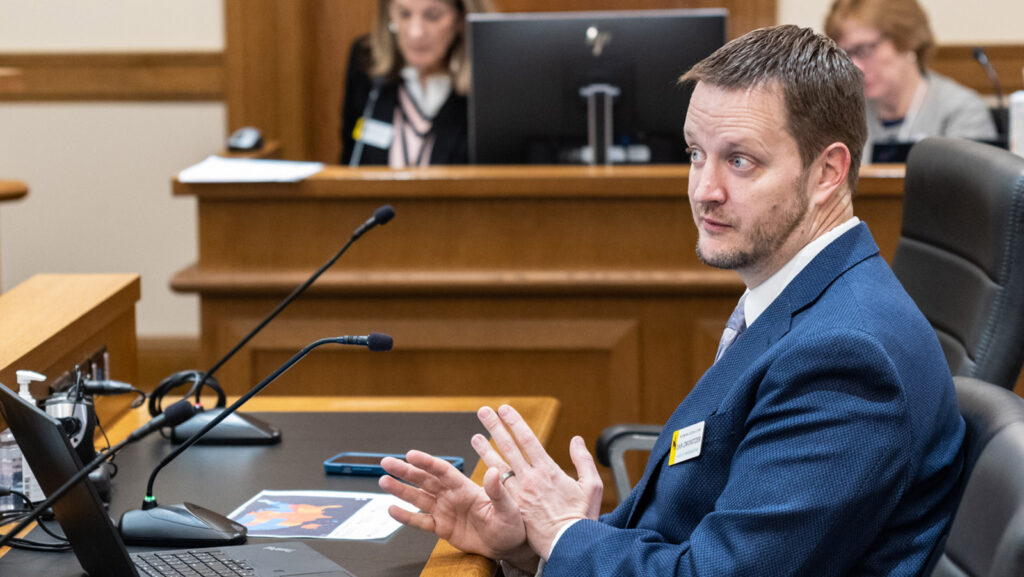
What’s The Party Line?
One of the most distinguishable features of the 2023 Legislature has been the consistent vote margins seen in the state House of Representatives.
A large number of votes have fallen along the lines of Freedom Caucus vs. non-Freedom Caucus members, particularly noticeable during votes taken on amendments to the supplemental budget bill. There are about 26 legislators aligned with the Freedom Caucus.
“It’s 31-26 on 80% of the votes, not counting the five Dems,” Zwonitzer said about the dividing line.
The Republican split in the Wyoming House is in many ways consistent with the party’s dynamics on a national level. Conservatives are couched as either more moderate or farther right than other Republicans.
Rep. John Bear, R-Gillette, chairman of the Freedom Caucus, agrees there’s a schism, but said the only difference is it’s more evident in Wyoming.
“This is beneficial to the people of the Wyoming, that if they like what we’re doing we’ll continue to grow,” he said. “If they don’t like what we’re doing, we’ll dissipate.”
In response to a perception that Democrats were becoming more liberal and the election of former President Barack Obama, hardline conservative populist movements and groups like the Tea Party became much more common around 2010.
The Freedom Caucus has resisted local control in deference to a statewide mandate on a number of issues this year, despite small government being one of the main tenets of traditional Republicanism and conservative thought.
“Whether it’s Communism, Socialism, extreme liberals, extreme conservatives – they all meet at one place, and that’s authoritarianism,” the anonymous legislator said.
In Lockstep?
At least 10 members of the Freedom Caucus are not Wyoming natives and one moved to the state as recently as 2021. The legislator believes many new political transplants are bringing more aggressive campaign tactics from other states.
Zwonitzer said the Freedom Caucus has been so oppositional on certain issues it has motivated he and others to resist voting with their members on less-contentious issues and to try and avoid most debates. He said most of the debates have been fruitless.
“And that’s the real problem we’re dealing with, it’s not worth it to discuss issues because they’ve got their minds made up somehow and they vote in lockstep,” he said. “It’s a bloc and we just have to work around it to get legislation passed on a lot of stuff.
Rep. Bob Davis, R-Baggs, said the divisions within the House are a sign of healthy government, while Rep. Ken Pedergraft, R-Sheridan, said he sees deadlock as a positive attribute of reducing government. Both are Freedom Caucus members.
Despite having a community college in Sheridan, Pendergraft still opposed a bill supported by the school that allows community colleges less impediments to approving capital construction projects.
“The story goes that if we don’t add, we don’t keep up with inflation,” Pendergraft said. “The problem there is that you’re assuming that we want the government to keep the same footprint. We dont, we want to curtail government.”
Pendergraft mentioned the recent supplemental budget bill as an example of unnecessary government expansion. In the end, the Legislature put $1.4 billion into savings while spending $383 million. Pendergraft said the only budget bill he would have supported would have had a net zero spending impact.
“In order to get me to vote yes on a budget, you’re going to have start cutting things and making government smaller,” he said.
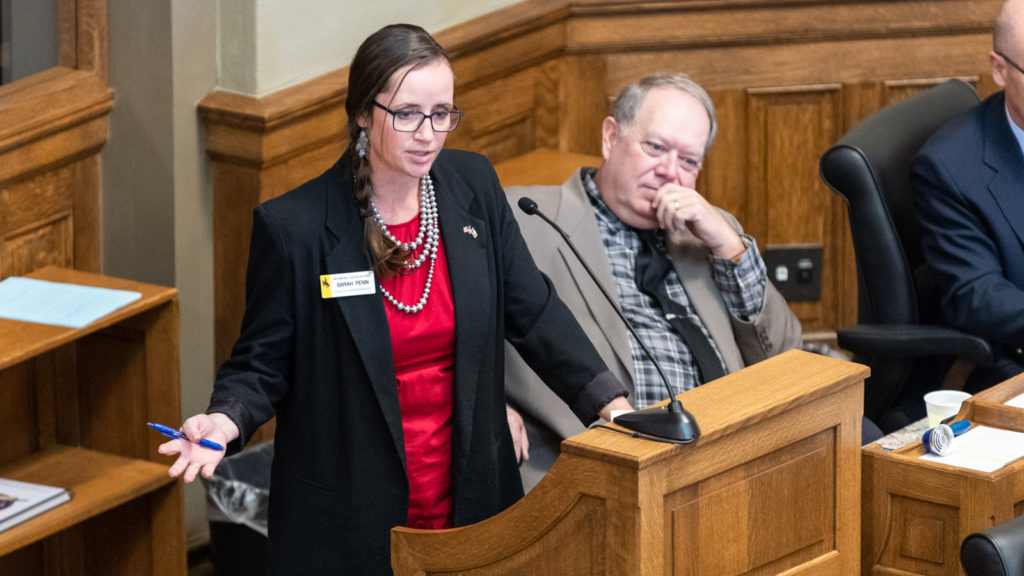
‘They Don’t Seem To Understand’
Zwonitzer believes many Freedom Caucus members are voting on purely philosophical grounds, often lacking a full comprehension of what they’re actually voting for.
Although Rep. Sarah Penn, R-Riverton, voted against $7.5 million budget expenditure to fund a physician’s assistant school at the University of Wyoming, she herself went to the University of Colorado to earn a Masters in nursing.
“They don’t seem to understand the legislation enough to realize they voted no on some bills that … reduced costs, increases efficiency, accountability and transparency,” Zwonitzer said. “There’s this kind of sense they don’t fully understand the legislation and they don’t make an attempt to talk to at least us, the other legislators about it.”
Rep. Karlee Provenza, D-Laramie, told Cowboy State Daily earlier this month that she believes certain members of the House are opposing bills purely because of who was sponsoring and supporting the legislation. The anonymous legislator described it simply as “a rough dynamic.”
“I think we’ve got some members who are just being told how to vote, who get that daily text from the Freedom Caucus saying how to vote and they just vote that, they’re not actually thinking about the issues,” they said. “It’s the worst I’ve ever seen it.”
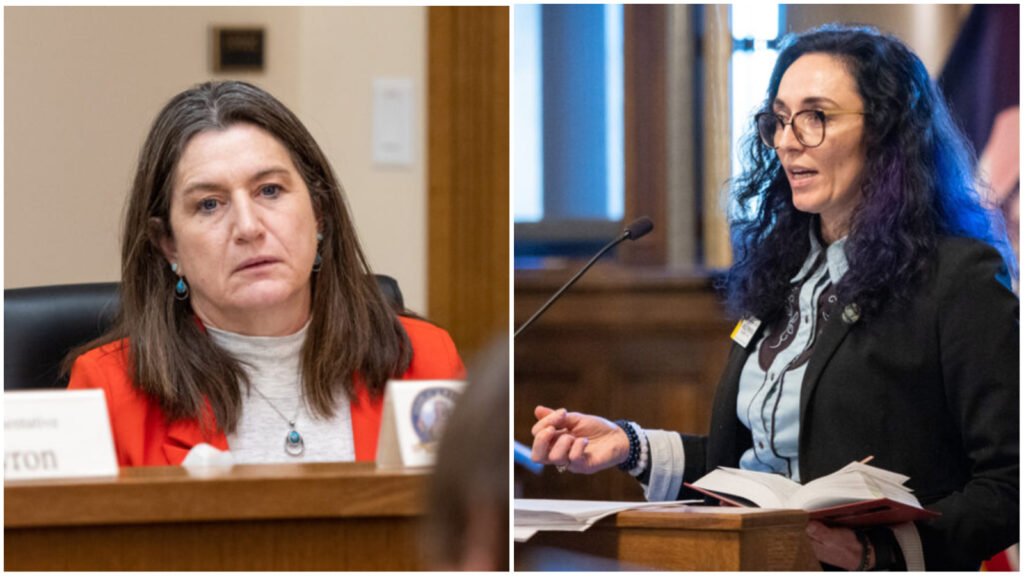
‘If You Don’t Stand On The Platform, Go Be A Democrat’
Rep. Tomi Strock, R-Douglas, said the Freedom Caucus is a group of likeminded lawmakers following the Republican Party platform and the wishes of constituents. Most of her freshman colleagues in the caucus ran on pledges to reduce government and spend less. In her view, the more laws that are passed equates to more freedoms being taken away.
“We have Ten Commandments that nobody follows, nobody is perfect to follow them, and we think we can add more laws, more mandates, more this is what you do, to expect people to follow it?” she said.
Strock some of the more moderate Republicans are likewise representing the more moderate views of their constituents, while others aren’t being completely transparent about their political views.
“If you don’t stand on the platform, go be a Democrat,” she said. “Be honest about who you are.”
Singh said he doesn’t like when fellow members of the Republican Party belittle each other, but also believes there are members who are not strictly adhering to the party’s platform.
“The issues where you see Freedom Caucus members voting in a bloc are issues that are philosophically directly concerned with the party platform,” he said.
Hazing?
Von Flatern said when favoritism becomes “logrolling” (i.e. the practice of trading of favors) or quid pro quo in politics is when legitimate ethical concerns arise.
“Actual logrolling is a bad thing,” he said.
Bear said the only repercussion a legislator may face for not voting frequently enough with the Freedom Caucus is they might not receive full membership to the group in the future. He said what that could mean is the loss of a potential future campaign funding source and other resources, like an official endorsement from the Freedom Caucus.
The Wyoming Freedom Caucus has aligned itself under the umbrella of the State Freedom Caucus Network, a Washington, D.C.-based organization assisting with local-level efforts and paying Wyoming State Director Jessie Rubino’s salary.
Bear said no freshman legislator is considered an official member of the caucus yet; that needs to be earned with a voting record that’s favorable to the group.
But that doesn’t mean people are being ordered or coerced to vote along Freedom Caucus mandates, Bear said.
“They’re voting that way because they want to, nobody is twisting their arm,” he said.
The anonymous legislator told Cowboy State Daily they heard that Rep. Dalton Banks, R-Cowley, had been told he had to sit in the back of the House chamber for a period of time because he voted the wrong way on a particular bill. Banks told CSD that rumor is “absolutely absurd,” and he had chosen to sit where he did that day on his own volition.
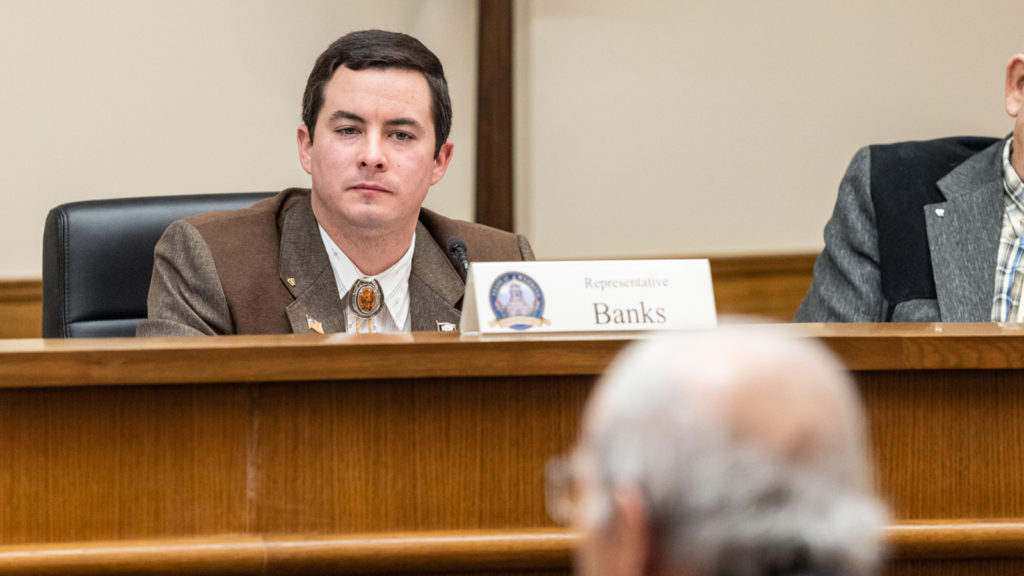
Messages Aren’t Mandates
Strock said although Freedom Caucus members receive messages each day on how to vote, there are full discussions on the votes and no pressure placed on members to vote certain ways.
She mentioned how she received no negative feedback despite voting against most of her fellow members on a bill to override House Speaker Albert Sommers, R-Pinedale, last week.
“I felt where Speaker Sommers said, ‘No, I’m not going to move that bill,’ I thought we needed to follow him,” Strock said. “I felt like he’s our leadership, we should follow him. That was my perspective of it and none of my people gave me a hard time.”
Singh joked that the worst retribution he’s ever received for voting outside the recommendations was a scowl from fellow Freedom Caucus member Clarence Styvar of Cheyenne.
Bear also pointed out that any legislator can be an associate member of the Freedom Caucus at any time by joining in on letters and other one-off projects. He mentioned how he recently collaborated with Jackson Democrat Liz Storer on an amendment.
Rep. Reuben Tarver, R-Gillette, is closely aligned with the caucus as a result of his voting record, but said he feels no overarching allegiance.
Although he’s opposed to growing government, Tarver describes himself as a “conservative within reason.”
“We have to keep the state running so there’s expenditures that have to be made,” he said.
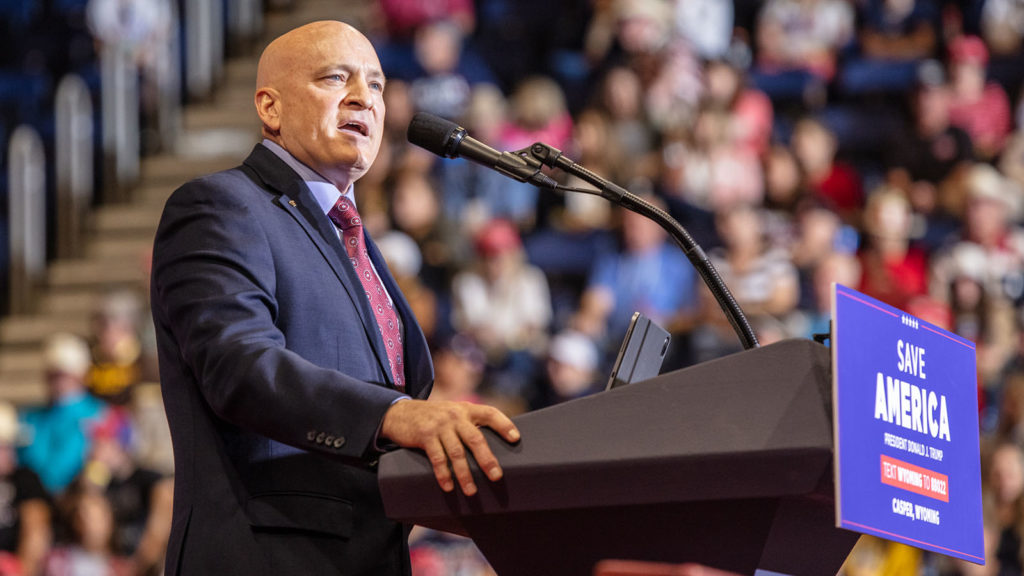
Just Getting Started?
The anonymous representative told CSD they believe there will be reciprocal actions from other members of the House in future years to match the efforts of the Freedom Caucus and start playing hardball in upcoming elections.
“We need to push back and push back hard,” they said. “None of those guys have really been attacked, really dragged through the mud. They’ve been on the giving end, but they haven’t been on the receiving end.”
Another legislator said there are mixed feelings about whether this is the best course of action. They said the more moderate members of the Legislature have the numbers “to steamroll” the Freedom Caucus whenever they want, but they don’t believe it’s the right thing to do.
“We can’t quite figure out if we want to play hardball or if they’re going to figure it out,” they said. “Politics aren’t supposed to be like this – at least they didn’t use to be like this.”
Bear said it’s his goal to have “conservatives” taking up a majority of the seats in the state House, meaning those farther right who align more with the Freedom Caucus.
When that day comes, the Freedom Caucus will no longer be the up-and-coming underdog faction it has prided itself on, a dilemma Bear said he has wrestled with and is already trying to prepare for.
“I want conservatives to govern, and I want them to do it well,” he said. “I don’t want them to be in a situation where the state suffers.”

